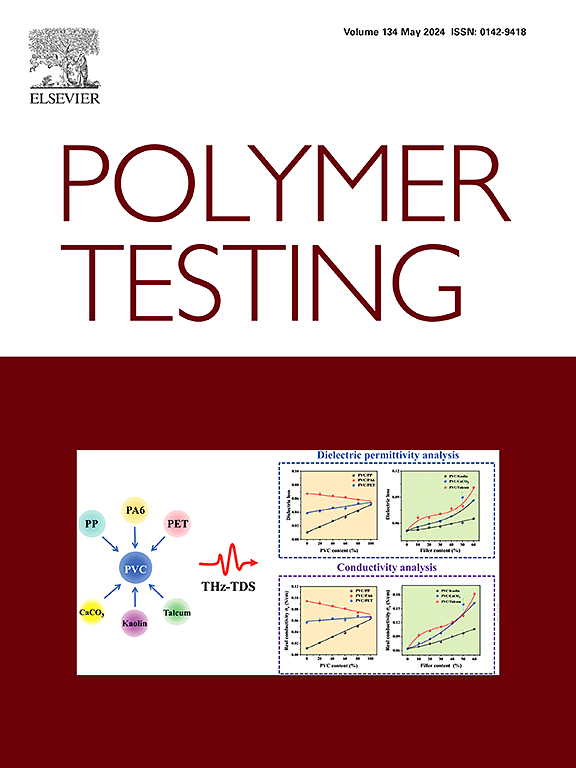微注塑聚甲醛(POM)的分子量、机械性能和形态之间的关系
IF 5
2区 材料科学
Q1 MATERIALS SCIENCE, CHARACTERIZATION & TESTING
引用次数: 0
摘要
聚甲醛(POM)是一种快速结晶聚合物,其结构高度依赖于加工条件,并具有广泛的机械性能。我们选择了三种不同分子量的聚甲醛材料,并通过改变熔体温度、模具温度和注塑速度进行了实验设计(DoE)。分子量越大,粘度越高,在一定的注塑速度和几何条件下,流动阻力和剪切应力也会增加。因此,形态差异的范围不仅取决于工艺边界条件,还取决于流变条件。这一点对于微注塑成型零件尤为重要,因为其作用冷却和剪切速率远高于标准注塑成型。实验采用了专门设计的具有径向对称截面的拉伸棒,它在对称流动和冷却行为方面具有优势。通过样品中心的薄片对形态进行了研究。差示扫描量热法(DSC)用于研究样品的结晶度,而机械性能则是通过使用光学拉伸仪进行拉伸测试来确定的。低分子量聚甲醛的机械性能受工艺变化的影响很小。然而,高分子量聚甲醛在表皮层的形成方面受到很大影响,低注塑速度有利于改善其机械性能。本文章由计算机程序翻译,如有差异,请以英文原文为准。
Correlations between molecular weight, mechanical properties and morphology of micro-injection molded polyoxymethylene (POM)
Polyoxymethylene (POM) is a fast crystallizing polymer, whose structure is highly dependent on the processing conditions and is showing a broad range of mechanical properties. Three POM materials with different molecular weights were selected and a design of experiments (DoE) was performed varying melt temperature, mold temperature, and injection speed. In combination with increased viscosity at higher molecular weights, the flow resistance and shear stresses will also increase at a certain injection speed and geometric conditions. Thereby, the range of morphological differences depends not only on the process boundary conditions but also on the rheological conditions. This aspect is particularly relevant for micro-injection molded parts, as the acting cooling and shearing rates are much higher than in standard injection molding. A specially designed tensile rod with a radially symmetric cross section was utilized for the experiments, which offers advantages in terms of a symmetric flow and cooling behavior. The morphology was studied with thin sections from the center of the sample. Differential Scanning Calorimetry (DSC) was used to study the crystallinity of the samples and the mechanical properties were determined by a tensile test using an adopted optical extensometer. The mechanical properties of low molecular weight POM are only to a minor extent affected by the process variations. However, higher molecular weight POM is greatly affected in terms of its skin layer formation and improved mechanical properties favored by a low injection velocity.
求助全文
通过发布文献求助,成功后即可免费获取论文全文。
去求助
来源期刊

Polymer Testing
工程技术-材料科学:表征与测试
CiteScore
10.70
自引率
5.90%
发文量
328
审稿时长
44 days
期刊介绍:
Polymer Testing focuses on the testing, analysis and characterization of polymer materials, including both synthetic and natural or biobased polymers. Novel testing methods and the testing of novel polymeric materials in bulk, solution and dispersion is covered. In addition, we welcome the submission of the testing of polymeric materials for a wide range of applications and industrial products as well as nanoscale characterization.
The scope includes but is not limited to the following main topics:
Novel testing methods and Chemical analysis
• mechanical, thermal, electrical, chemical, imaging, spectroscopy, scattering and rheology
Physical properties and behaviour of novel polymer systems
• nanoscale properties, morphology, transport properties
Degradation and recycling of polymeric materials when combined with novel testing or characterization methods
• degradation, biodegradation, ageing and fire retardancy
Modelling and Simulation work will be only considered when it is linked to new or previously published experimental results.
 求助内容:
求助内容: 应助结果提醒方式:
应助结果提醒方式:


